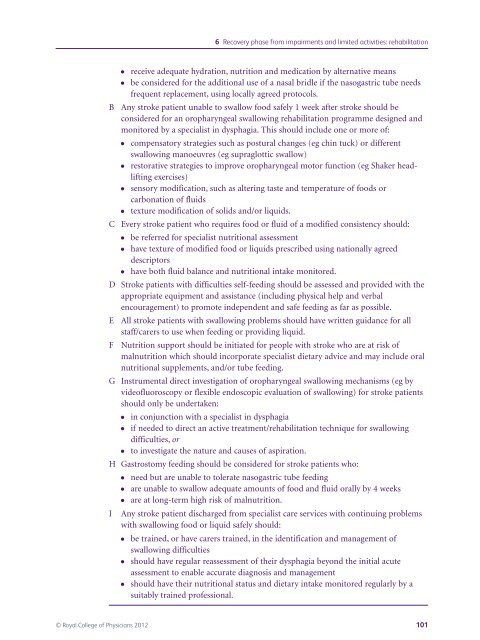national-clinical-guidelines-for-stroke-fourth-edition
national-clinical-guidelines-for-stroke-fourth-edition
national-clinical-guidelines-for-stroke-fourth-edition
Create successful ePaper yourself
Turn your PDF publications into a flip-book with our unique Google optimized e-Paper software.
● receive adequate hydration, nutrition and medication by alternative means<br />
● be considered <strong>for</strong> the additional use of a nasal bridle if the nasogastric tube needs<br />
frequent replacement, using locally agreed protocols.<br />
B Any <strong>stroke</strong> patient unable to swallow food safely 1 week after <strong>stroke</strong> should be<br />
considered <strong>for</strong> an oropharyngeal swallowing rehabilitation programme designed and<br />
monitored by a specialist in dysphagia. This should include one or more of:<br />
● compensatory strategies such as postural changes (eg chin tuck) or different<br />
swallowing manoeuvres (eg supraglottic swallow)<br />
● restorative strategies to improve oropharyngeal motor function (eg Shaker head-<br />
lifting exercises)<br />
6 Recovery phase from impairments and limited activities: rehabilitation<br />
● sensory modification, such as altering taste and temperature of foods or<br />
carbonation of fluids<br />
● texture modification of solids and/or liquids.<br />
C Every <strong>stroke</strong> patient who requires food or fluid of a modified consistency should:<br />
● be referred <strong>for</strong> specialist nutritional assessment<br />
● have texture of modified food or liquids prescribed using <strong>national</strong>ly agreed<br />
descriptors<br />
● have both fluid balance and nutritional intake monitored.<br />
D Stroke patients with difficulties self-feeding should be assessed and provided with the<br />
appropriate equipment and assistance (including physical help and verbal<br />
encouragement) to promote independent and safe feeding as far as possible.<br />
E All <strong>stroke</strong> patients with swallowing problems should have written guidance <strong>for</strong> all<br />
staff/carers to use when feeding or providing liquid.<br />
F Nutrition support should be initiated <strong>for</strong> people with <strong>stroke</strong> who are at risk of<br />
malnutrition which should incorporate specialist dietary advice and may include oral<br />
nutritional supplements, and/or tube feeding.<br />
G Instrumental direct investigation of oropharyngeal swallowing mechanisms (eg by<br />
videofluoroscopy or flexible endoscopic evaluation of swallowing) <strong>for</strong> <strong>stroke</strong> patients<br />
should only be undertaken:<br />
● in conjunction with a specialist in dysphagia<br />
● if needed to direct an active treatment/rehabilitation technique <strong>for</strong> swallowing<br />
difficulties, or<br />
● to investigate the nature and causes of aspiration.<br />
H Gastrostomy feeding should be considered <strong>for</strong> <strong>stroke</strong> patients who:<br />
● need but are unable to tolerate nasogastric tube feeding<br />
● are unable to swallow adequate amounts of food and fluid orally by 4 weeks<br />
● are at long-term high risk of malnutrition.<br />
I Any <strong>stroke</strong> patient discharged from specialist care services with continuing problems<br />
with swallowing food or liquid safely should:<br />
● be trained, or have carers trained, in the identification and management of<br />
swallowing difficulties<br />
● should have regular reassessment of their dysphagia beyond the initial acute<br />
assessment to enable accurate diagnosis and management<br />
● should have their nutritional status and dietary intake monitored regularly by a<br />
suitably trained professional.<br />
© Royal College of Physicians 2012 101


